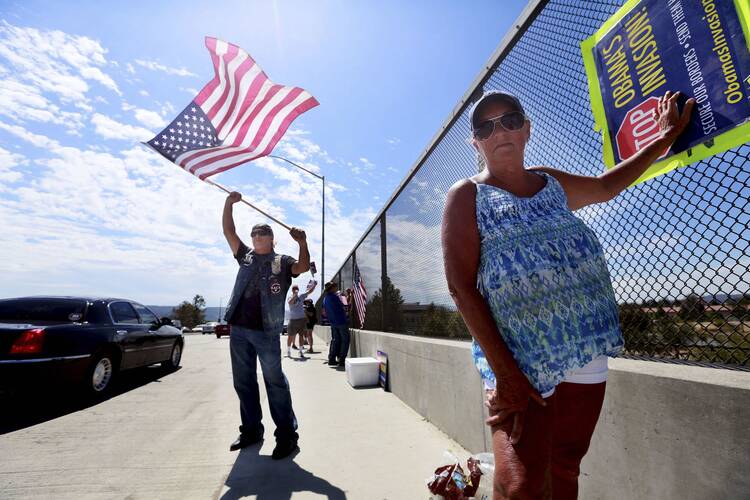There’s something about the sunlight in Southern California. It’s severe, unforgiving, as though a camera’s shutter has been left open too long; everything appears overexposed.
One hour northeast of San Diego, in the area of California known as the Inland Empire, the town of Murrieta has recently found itself thrust into a similarly harsh light. On July 1 hundreds of protesters in Murrieta prevented three buses filled with Central American migrants—mothers with small children and often children traveling alone, the “unaccompanied minors” who have collected into a crisis at the border—from being processed at the Murrieta Border Patrol Center. The event made national news and incited similar demonstrations elsewhere.
Since those first dramatic confrontations, border agents have stopped using Murrieta, and the press has left, but orange plastic poles still dot the area around the protest site, warning people not to park there. Rotating teams of protesters relax under a tent in canvas chairs with sleeves for their drinks, chatting and checking their cellphones, their “Stop Obama’s Invasion” signs unattended nearby.
By most accounts, low-key amiability is much more the character of this community than the events of early July would suggest. While the town has over 100,000 residents, it has repeatedly been ranked by the F.B.I. as the second safest city in the United States. Alongside subdivisions with fancy names like Provence, Montserrat and Encanto lie small shops where you can buy “local bread and honey,” cut firewood, RVs and “a full line” of firearms.
The people of Murrieta are easy to talk to and quick to respond with warmth.
Some of the community’s residents even debate how many of the protesters were from Murrieta. “When I started my business here,” says an Ethiopian-American businessman, Ryan Haggerty, 28, “people welcomed me with open arms. Open arms. My siblings have gone to every school here, and their friends are a rainbow.”
The Rev. Jack Barker, pastor of St. Martha Catholic Church in Murrieta, notes that the local community is over 25 percent Latino, 15 percent Filipino and 10 percent black. Since the protests began, some parishioners—including some not in favor of the government’s immigration policies—have told him, “We’ll take one of the kids on the buses, Father. Don’t send them to foster care. We’ll take them.”
A white cross more than 70 feet tall adorns one of the hills of Murrieta, painted there by a Christian landowner who felt its presence might encourage passersby to think about the salvation that Christ offers.
And the example of Christ looms large over some of the debate here. Local bloggers with handles like “S.O.S.” and “Enough!” write how the protest was not about the children, but about “when this government would do something to solve the crisis going on in unprotected borders.”
Even some immigration supporters here feel besieged by government policy. The Murrieta processing center was meant to house 40 people at a time; the buses would have brought 140 every 72 hours. The patrol agents’ union representative complained vigorously.
Yet some of them also wonder how Jesus would respond. Enough! goes so far as to ask, “Jesus…what should I do?” and in another entry she asks, “Why Lord? Why Murrieta?” Remarkably, God answers back: “Why not Murrieta?”
Movements of the spirit bring other things to light. Eileen, a friendly Catholic mother of four from Costa Rica, sits at the protest site regularly. She says she has shed tears over the plight of immigrant children and their families. But when she prays to God for insight, the message she gets is that “it’s okay to stand for our Constitution and to keep all illegals out, [as long as it is] accompanied with processing how to help them in their country.” God “knows what could happen if the masses came over here,” she says, adding confidentially, “I’m talking about terrorists.”
When asked to name a favorite story about Jesus, believer Diana Serafin—a candidate for Murrieta City Council who used her mailing list to help mobilize the initial protests against the bus caravan—recalls the story of the loaves and the fishes.
It’s about sharing, she says. “Jesus took care of the people. And then he sent them back home.”
When it’s pointed out to her that in fact that is not how that story ends, Ms. Serafin chuckles like a kid caught with her hand in the cookie jar, conceding the point. Then she insists, as though she had been there, “But when it was over, the crowds did go home.”








